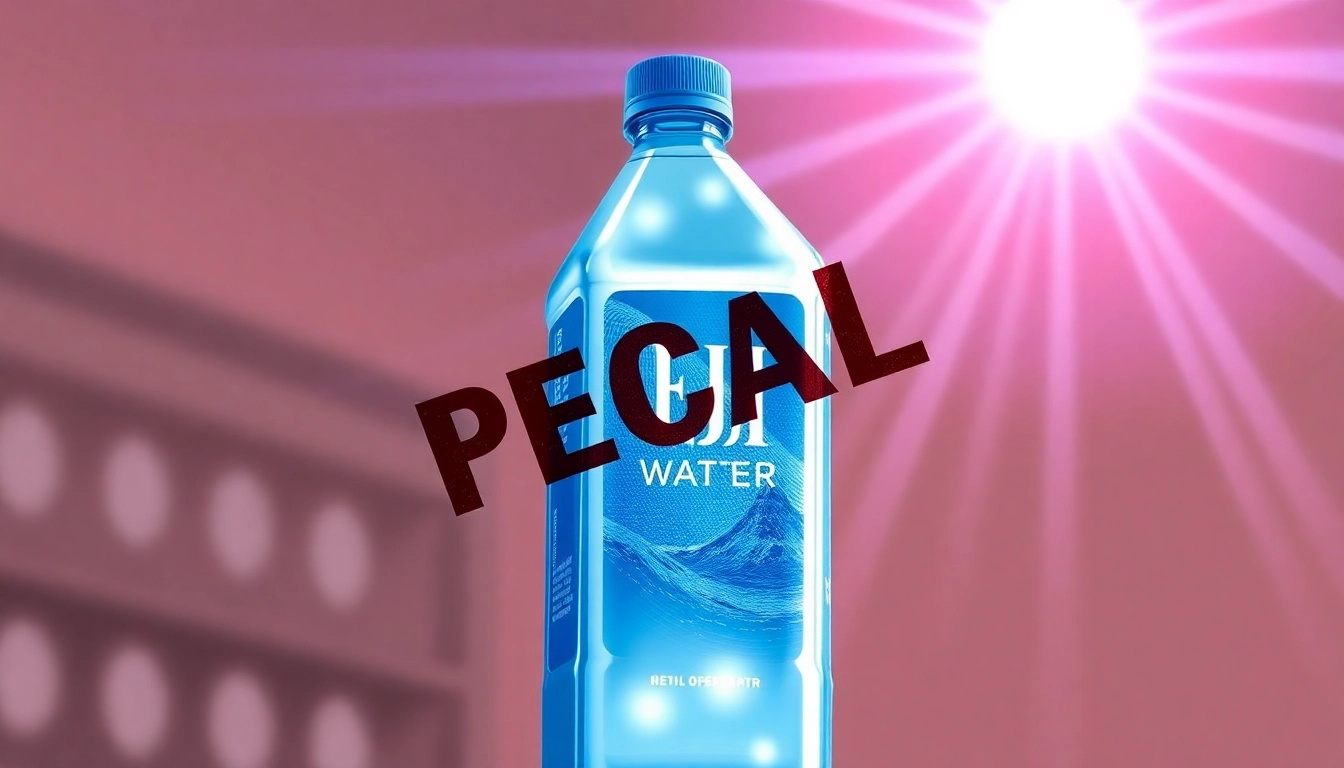Overview of the Fiji Water Recall 2024
In 2024, Fiji Natural Artesian Water, one of the most recognized bottled water brands globally, faced a significant challenge with the announcement of a recall affecting nearly 1.9 million bottles. This incident arose from concerns related to elevated levels of manganese and the presence of harmful bacteria in their water supply. Affected products were primarily the 500 mL bottles sold in 24-packs, which prompted reaction not only from consumers but also from health authorities and regulatory agencies. For detailed insights into this situation, you can explore the fiji water recall 2024 to navigate the implications of the recall and ascertain how it affects your purchases.
What Triggered the Recall?
The recall, initiated on March 4, 2024, resulted from routine testing revealing concerning Manganese levels in the bottled water supply along with the detection of three different genera of bacteria known to pose health risks. Manganese, when consumed in excessive amounts, can be detrimental to health, especially for individuals with pre-existing conditions or vulnerabilities. Bacterial contamination, on the other hand, can lead to gastrointestinal distress and other health complications.
According to reports, the contamination was traced back to specific production batches that were bottled in late 2023. Following these findings, Fiji Water took immediate action to prevent further distribution of affected products and began coordinating with the Food and Drug Administration (FDA) and other health agencies to ensure consumer safety.
Scope and Impact of the Recall
The product recall impacted a substantial number of consumers across various states in the U.S., particularly those who purchased Fiji Water through major retailers, including Amazon. This incident raised immediate questions about the safety of not just Fiji Water, but bottled water in general. The broader implications spurred discussions about quality control measures in the beverage industry and how companies respond to such crises.
The scale of the recall, covering nearly 1.9 million bottles, sent shockwaves through the bottled water market, and it was seen as one of the most significant recalls of a beverage product in recent years. The FDA’s involvement underscored the seriousness of the issue, as the agency works to protect public health.
Official Statements from the Company
In response to the crisis, Fiji Water’s parent company released several statements emphasizing their commitment to quality and consumer safety. They reassured customers that immediate steps were taken to remove affected products from store shelves and halted further distribution. They also expressed regret over the situation and emphasized their rigorous quality control procedures. Regular updates were provided on their official website to keep consumers informed about the recall process and what steps they should take.
Health Risks Associated with Fiji Water 2024
The health risks stemming from the recall are a significant concern for consumers. It is crucial to understand these risks to make informed decisions regarding health and safety.
Understanding Manganese Levels in Water
Manganese is a mineral that is essential in small quantities but can become harmful when consumed in large amounts. The human body requires manganese for several physiological functions, including bone formation and antioxidant properties. However, excessive manganese intake may lead to neurotoxicity and other health complications, particularly affecting individuals with liver dysfunction.
The FDA has established guidelines for acceptable manganese levels in drinking water, and products exceeding these levels pose health risks. While rare for bottled water, the contamination in Fiji Water drew attention to the importance of ongoing monitoring within the bottled water industry.
Identifying Contaminants: Bacteria and More
Bacterial contamination in drinking water can lead to various illnesses, with symptoms ranging from mild gastrointestinal issues to serious infections requiring medical intervention. The specific bacteria identified in the Fiji Water recall included genera known to cause health complications, adding urgency to the recall process.
During this crisis, it became essential for consumers to identify the signs of contamination in any beverage products, encouraging people to be vigilant and knowledgeable about their health choices. Awareness regarding the quality and safety of bottled water has been elevated, prompting consumers to seek additional information before purchase.
Consumer Safety Measures
In light of the recall, various safety measures were recommended for consumers to mitigate health risks. These included:
- Regularly checking for recall notifications through official channels such as the FDA’s database.
- Being aware of product codes associated with recalled items, enabling easier identification.
- Monitoring for updates from the manufacturer regarding the safety status of their products.
These practices not only apply to Fiji Water but should be adopted across all bottled products to enhance consumer safety.
How to Check if Your Fiji Water is Affected
For consumers uncertain about whether their Fiji Water bottles are part of the recall, several steps can be taken to verify product safety.
Identifying Recalled Product Codes
Identifying the UPC codes on your Fiji Water products can quickly determine if your purchase is affected. The recalled units typically carry specific UPC codes related to their packaging batches. Notably, product codes to pay attention to include case UPC code 6 32565 00004 3 and bottle UPC code 6 32565 00001 2, along with production dates that fall into the unsafe range, generally those produced in November 2023.
Consumers should review their receipts and packaging closely to ascertain whether their products fall within the recall parameters. Awareness of these codes is crucial for consumer safety to avoid potential health risks.
Where to Find Recall Information
Official recall information can often be accessed through several channels:
- The FDA’s official website, which maintains a complete list of recalls and safety alerts.
- The Fiji Water company’s website, where updates regarding the status of products are frequently posted.
- News outlets and specialized food safety organizations that report on significant recalls in the beverage and food industry.
These resources provide easy access to timely and accurate information regarding product safety.
Contacting Customer Service for Inquiries
If consumers have questions or concerns about their Fiji Water products, contacting customer service is essential. The company has dedicated resources to handle inquiries related to the recall, and customers can reach out via email or phone for prompt assistance. A proactive approach to communication can ensure that consumers remain informed about product safety and recall procedures.
What Steps to Take if You Have Recalled Fiji Water
If you discover that you have purchased Fiji Water that falls under the recall category, it is important to know the appropriate steps to take to ensure your safety and to handle the situation properly.
Returning Products and Seeking Refunds
Consumers with recalled products should look for the return procedures specified by the retailer or manufacturer to get refunds. Typically, retailers like Amazon or local grocery stores will have policies established for handling recalled products, allowing consumers to return the items for a full refund or exchange. It’s essential to keep receipts and documentation of the purchase to facilitate a smooth return process.
Health Precautions to Follow
If you suspect that you may have consumed contaminated Fiji Water, it’s wise to monitor your health closely. Should you experience any unusual symptoms, particularly gastrointestinal distress or other health complications, it’s prudent to consult a healthcare professional for advice and care. Also, maintaining hydration with safe alternatives while the recall is ongoing is essential for overall health.
Alternatives to Fiji Water During the Recall
During the recall, consumers might opt for alternatives while they navigate the situation. Brands like Evian, Smartwater, and other bottled water products provide safe, high-quality hydration solutions. Additionally, filtered tap water can serve as a sustainable and health-conscious option, reducing reliance on bottled products and addressing environmental concerns associated with single-use plastics.
Future of Fiji Water Post-Recall in 2024
The aftermath of the recall is critical for Fiji Water’s image and consumer trust. The company faces the challenge of not only addressing the current issues but also ensuring that similar incidents do not occur in the future.
Reassessing Quality Control Measures
In response to the recall, Fiji Water and its parent company are likely to reassess and bolster existing quality control measures. Implementing more rigorous testing protocols and involving third-party laboratories for unbiased evaluations could help enhance product safety and prevent future contamination incidents.
This proactive approach serves as a necessary step for restoring confidence among consumers who may shadow Fiji Water’s credibility due to this damaging recall.
The Brand’s Plan for Rebuilding Trust
Rebuilding trust after a significant recall can take time. Fiji Water may engage in comprehensive public relations campaigns, highlighting their commitment to safety and quality through social responsibility initiatives. Transparency will be key—regularly updating the public on quality control improvements and demonstrating accountability can assist in regaining consumer confidence.
Long-Term Effects on Consumer Choices
The effects of the Fiji Water recall could lead to long-term changes in consumer preferences. As awareness grows regarding potential contaminants, consumers might diversify their water sources or favor brands with a more transparent commitment to product safety. Success in navigating the post-recall landscape will also depend on how promptly and effectively the company implements changes and communicates them to the public.



